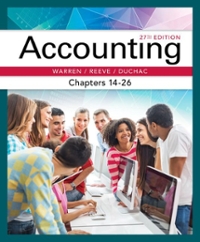Answered step by step
Verified Expert Solution
Question
1 Approved Answer
16. On July 1, 20D, Thomas Company paid $2,400 for a two-year insurance policy on the building. The accounting period ends December 31. At the
| 16. On July 1, 20D, Thomas Company paid $2,400 for a two-year insurance policy on the building. The accounting period ends December 31. At the end of 20D, the financial statements should report 1: On the Balance Sheet 2: On the Income StatementA)1: Prepaid insurance, $2,400 2: Insurance expense, $0. B)1: Prepaid insurance, $0 2: Insurance expense, $2,400. C)1: Prepaid insurance, $1,800 2: Insurance expense, $600. D)1: Prepaid insurance, $1,200 2: Insurance expense, $1,200. E)None of the above is correct. 17. Which of the following errors would most likely lead to an overstatement of income in the current accounting period?A)Recording revenue next period when the cash is collected although it is earned in the current period. B)Recording a current-period expense in the following year when cash is paid. C)Failure to adjust deferred rent revenue account for the portion of rent earned this year. D)All of the above lead to overstated income this period. E)None of the above leads to overstated income this period. 18. Assuming the allowance method for bad debts is used, when a customer's uncollectible account is written off, a credit should be made toA)Bad debt expense. B)Allowance for doubtful accounts. C)Sales revenue. D)Accounts receivable. E)Retained earnings. 19. A company purchased goods on credit with credit terms of 3/15, n/45. Although the company does not have cash available to pay within the discount period, the manager of the company is considering borrowing money to take advantage of the discount. In order to make the appropriate decision, the manager computed the annual interest rate associated with the sales discount. This annual rate is approximatelyA)56%. B)37%. C)25%. D)18%. 20. Albert Company uses the allowance method to account for bad debts. The entry to write-off a bad account (one that will never be collected) should be:A)Debit: Bad debt expense; Credit: Accounts receivable B)Debit: Bad debt expense; Credit: Allowance for doubtful accounts C)Debit: Sales revenue; Credit: Accounts receivable D)Debit: Allowance for doubtful accounts; Credit: Accounts receivable E)None of the above is correct 21. Which of the following demonstrates a poor internal control procedure?A)The bookkeeper makes cash deposits and records journal entries related to cash, while the treasurer prepares the bank reconciliation. B)The president, who does no bookkeeping, prepares the bank reconciliation each month. C)The treasurer signs all checks after the bookkeeper prepares the supporting documents. D)One bookkeeper prepares cash deposits and the other bookkeeper enters the collections in the journal and ledger. E)All of the above are good internal control features. 22. A customer purchased a $200 item at Best Bike Shop, paying with a credit card (VISA). The merchant is charged a 2% fee by the credit card company. When recording this sale, the merchant would:A)debit accounts receivable for $200. B)credit sales revenue for $200. C)credit sales revenue for $196. D)credit unearned sales revenue for $200. E)None of the above is correct. 23. Which of the following would cause the receivable turnover ratio to increase?A)Reducing the time it takes to collect our customer accounts B)Increasing sales revenue at a faster rate than the rate of increase in accounts receivable C)Strengthening our credit and collection policies resulting in reduced receivables while sales remain constant D)None of the above causes the ratio to increase E)All of the above cause the ratio to increase 24. Johnstone Co. uses the periodic inventory system. The following information about their inventory of Model ZZ Mountain Bicycles is available:
During the year, 235 bicycles were sold at a price of $1,500 each. Other operating costs equaled $80,000 and their tax rate is 30%. Round final answers to the nearest dollar. What was ending inventory and cost of goods sold on 12/31 under the LIFO cost flow assumption? A)$51,000 and $194,100 B)$48,200 and $196,900 C)$49,851 and $195,249 D)None of the above. 25. Which of the following is correct?A)Beginning Inventory + Purchases - Cost of Goods Sold = Ending Inventory. B)Sales + Cost of Goods Sold = Gross Margin. C)Beginning Inventory + Ending Inventory - Purchases = Cost of Goods Sold. D)Income Before Taxes - Operating Expenses = Cost of Goods Sold. E)None of the above is correct. 26. In 2004, a company overstated ending inventory by $10,000. At the end of 2005, net income will be understated because ending inventory of 2004 becomes beginning inventory of 2005 thereby causing cost of goods available for sale to be overstated.A)True B)False 27. The records of Tea Time Company show 20D purchases of $9,000. An actual count revealed a 20D ending inventory of $4,000. The 20D beginning inventory was $5,000. What was cost of goods sold for 20D?A)$14,000 B)$18,000 C)$10,000 D)None of the above. 28. In the periodic inventory system, ending inventory is determined by taking an actual physical count of goods on hand on the last day of the accounting period; beginning inventory for the next period is determined by taking another physical count of goods on the first day of the new period.A)True B)False 29. The actual physical flow of goods in a company usually determines a company's choice of inventory costing method.A)True B)False 30. Owners of a company would prefer use of FIFO costing in a period of declining costs because it would minimize taxes paid.A)True B)False |
Step by Step Solution
There are 3 Steps involved in it
Step: 1

Get Instant Access to Expert-Tailored Solutions
See step-by-step solutions with expert insights and AI powered tools for academic success
Step: 2

Step: 3

Ace Your Homework with AI
Get the answers you need in no time with our AI-driven, step-by-step assistance
Get Started


